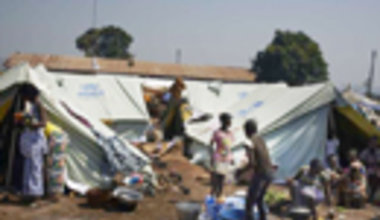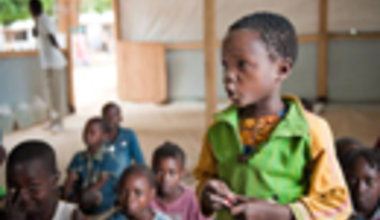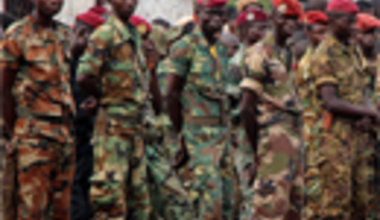UN rights chief warns cycle of violence may ‘spin out of control’
8 November 2013 – The top United Nations human rights official warned today that the deteriorating violence in the Central African Republic (CAR) may spin out of control, further destabilizing the country.
“The latest clashes between ex-Séléka forces and various self-defence groups, are extremely worrying. Such violent incidents have heightened tensions among communities, caused splits along religious and sectarian lines and could lead to further destabilization in the country,” said the UN High Commissioner for Human Rights, Navi Pillay.
“For decades, diverse ethnic and religious communities have lived together in this country. This escalation of violence and hatred must be halted before it spins completely out of control.”
Plagued by decades of instability and fighting, the CAR witnessed a resumption of violence last December when the Séléka rebel coalition launched a series of attacks. A peace agreement was reached in January, but the rebels again seized the capital, Bangui, in March, forcing President François Bozizé to flee.
There is now a transitional government, headed by Prime Minister Nicolas Tiangaye, entrusted with restoring law and order and paving the way for democratic elections. But armed clashes in the north-east have increased since the beginning of August, and the country is facing a dire humanitarian situation that affects the entire population of some 4.6 million.
Ms. Pillay said that recent reports of a massacre of mostly women and children in a village near Bouar on 26 October illustrate the level of violence prevailing in the CAR and the absolute disregard for human life shown by fighters – in this particular case, alleged ex-Séléka forces.
“I urge the authorities to immediately launch a transparent, independent investigation to verify these shocking reports,” she said.
In Bossangoa, several hundred civilians, including two humanitarian workers from the non-governmental organization Agency for Technical Cooperation and Development (ACTED) are reported to have lost their lives during the first two weeks of September during clashes between armed groups.
The UN, which recently visited the area, also received reports of widespread human rights violations committed by armed groups there, including summary executions, sexual violence, arrests and arbitrary detentions.
“The civilian population is bearing the brunt of this chaotic situation,” Ms. Pillay said. “Entire villages have been burned to the ground and widespread lootings continue to take place, including poaching of cattle.”
The High Commissioner also expressed concern about reports of illegal arrests, detentions and torture in secret detention centres in the capital, Bangui. According to information received by the UN, ex-Séléka forces working for the CEDAD (Comité extraordinaire pour la défense des acquis démocratiques), a committee set up after the last ministerial reshuffle, are allegedly responsible for illegal arrests and human rights abuses. The CEDAD is not legally mandated to detain individuals or investigate criminal offences.
“I call on the authorities to immediately look into these allegations and, if they are confirmed, to take urgent measures to ensure that illegal arrests, detention and the use of torture are halted immediately,” Ms. Pillay said.
“There is an urgent need for the restoration of the rule of law in the Central African Republic,” the High Commissioner said. “Unless immediate action is taken, both by the authorities and by the international community, there is a clear risk that the situation will degenerate rapidly and inexorably into a full-blown conflict.”
Also today, Under-Secretary-General for Political Affairs Jeffrey Feltman delivered a strong appeal from Secretary-General Ban Ki-moon for action to address the “dire” situation gripping the country and its population.
“We must now translate awareness and concern into effective action to ensure that the crisis is addressed in all its dimensions – security, political, human rights and humanitarian,” the Secretary-General said in a statement delivered by Mr. Feltman on his behalf to third meeting of the International Contact Group on the CAR in Bangui.
“Sparing the people of the Central African Republic more suffering and insecurity must be our collective goal. There is a chance to work together to reverse the downward spiral in the CAR and to set the country on a path toward peace and stability. Time is of the essence,” Mr. Ban said in the statement.
Meanwhile, a recent study conducted jointly by the UN, non-governmental organizations and the Government shows that more than one million people in the country are at risk of hunger, and warns that the situation could worsen because of poor harvests and drastic slowdown in economic activity following months of violence.
Since conflict erupted last year, many farmers fled their farms, leaving crops untended. The majority of households said that their livestock had been stolen. Some families sold livestock and seeds to survive, while others sold herds for fear of displacement or looting.
“Immediate action must be taken to end violence in the country to allow hundreds of thousands of displaced persons to return to their homes and farms,” said Housainou Taal, the World Food Programme’s (WFP) representative in CAR.
“We call upon the different armed groups to respect the rights of civilians and to provide humanitarian access for our staff to reach those in dire need.”
WFP has provided vital food assistance to around 250,000 people in CAR since January this year. To keep assisting some of the world’s most vulnerable people, the agency requires an additional $20 million from now until April 2014.
The areas where people face the greatest problems getting enough food include Ouham, Ouham-Pende and Nana Gribizi in the north, and Vakaga and Bamingui-Bangoran in the northwest. However, pockets of food insecurity are found throughout the country.
Source: UN News Centre
 UN
UN





